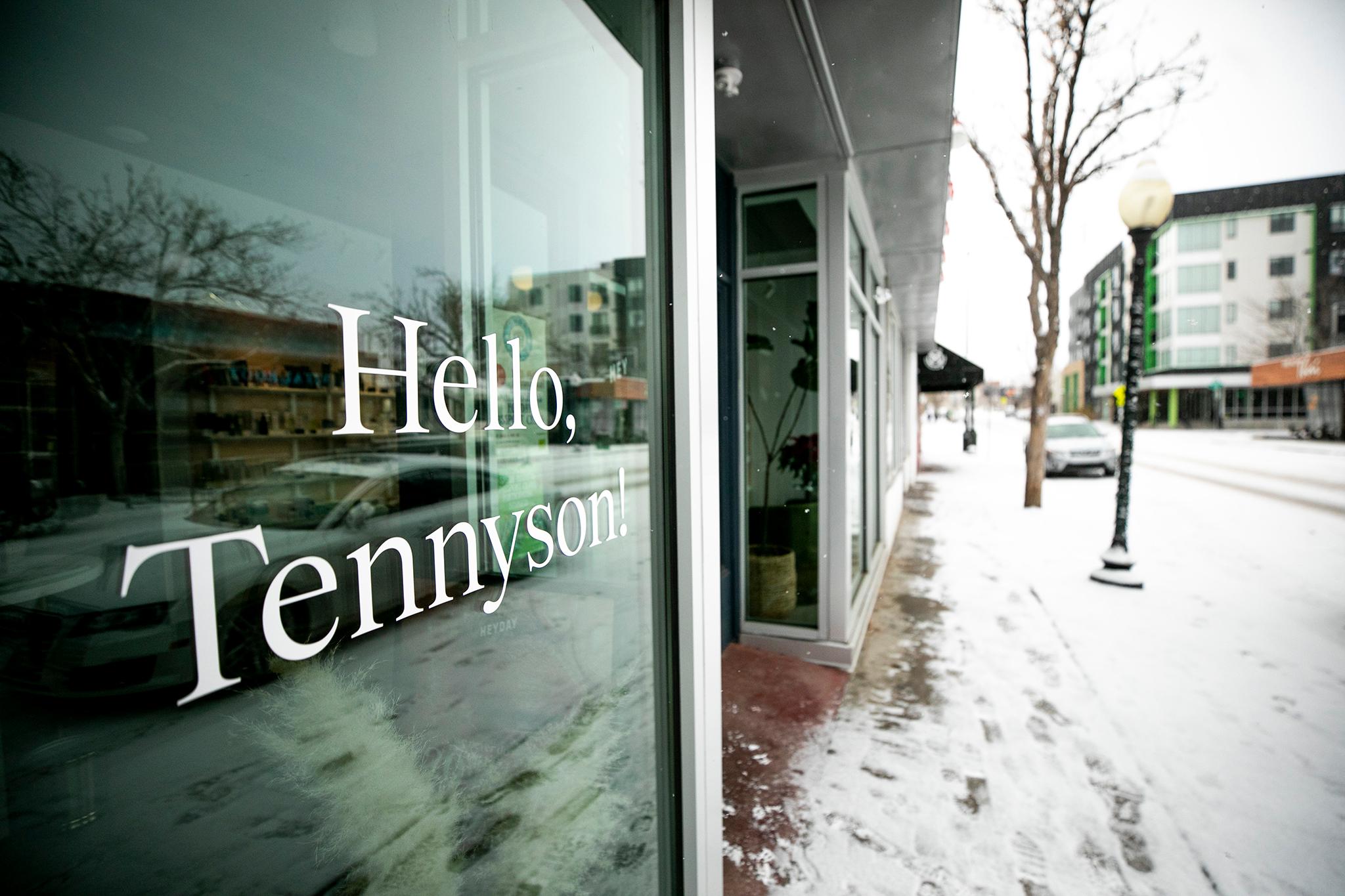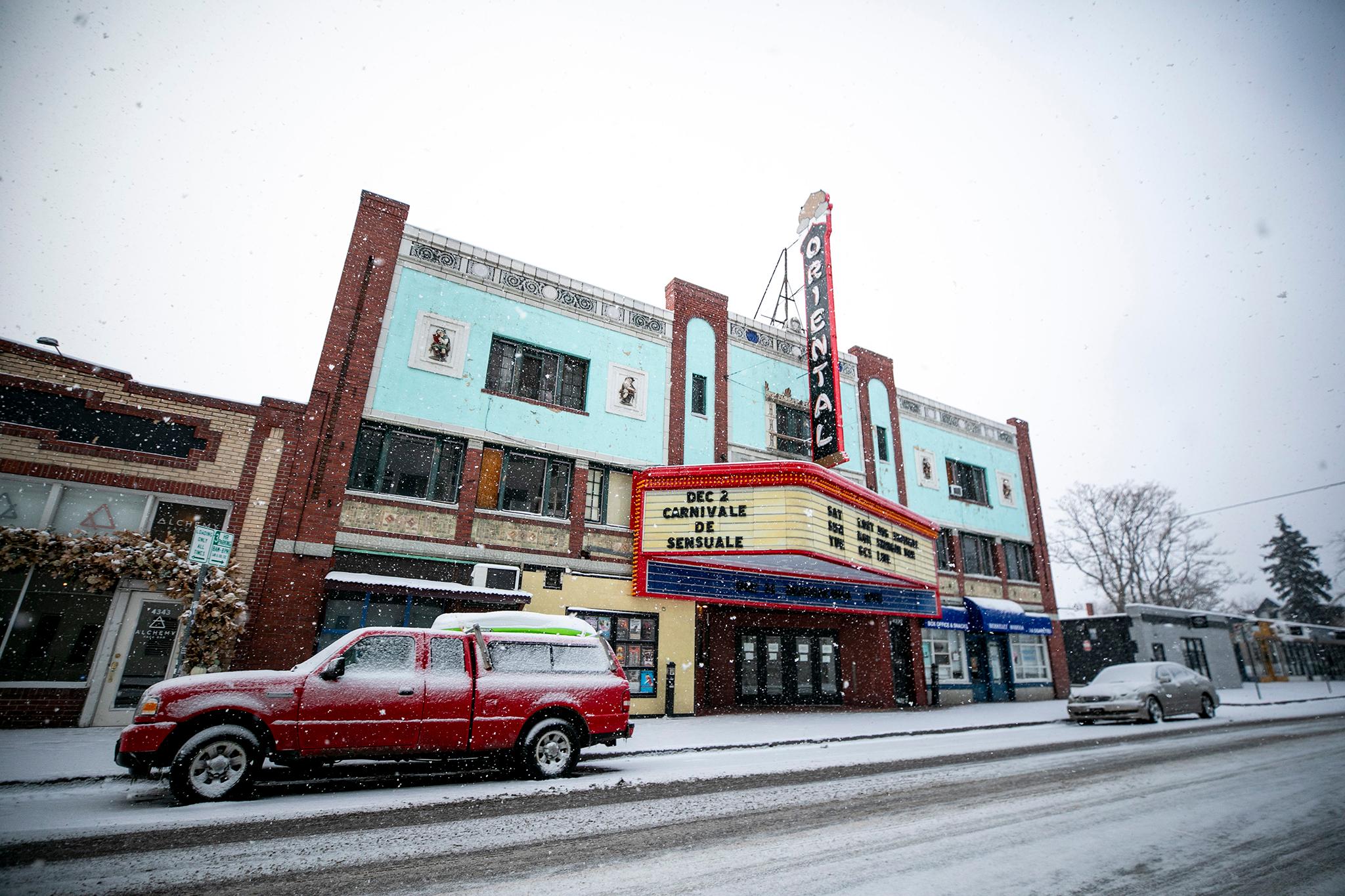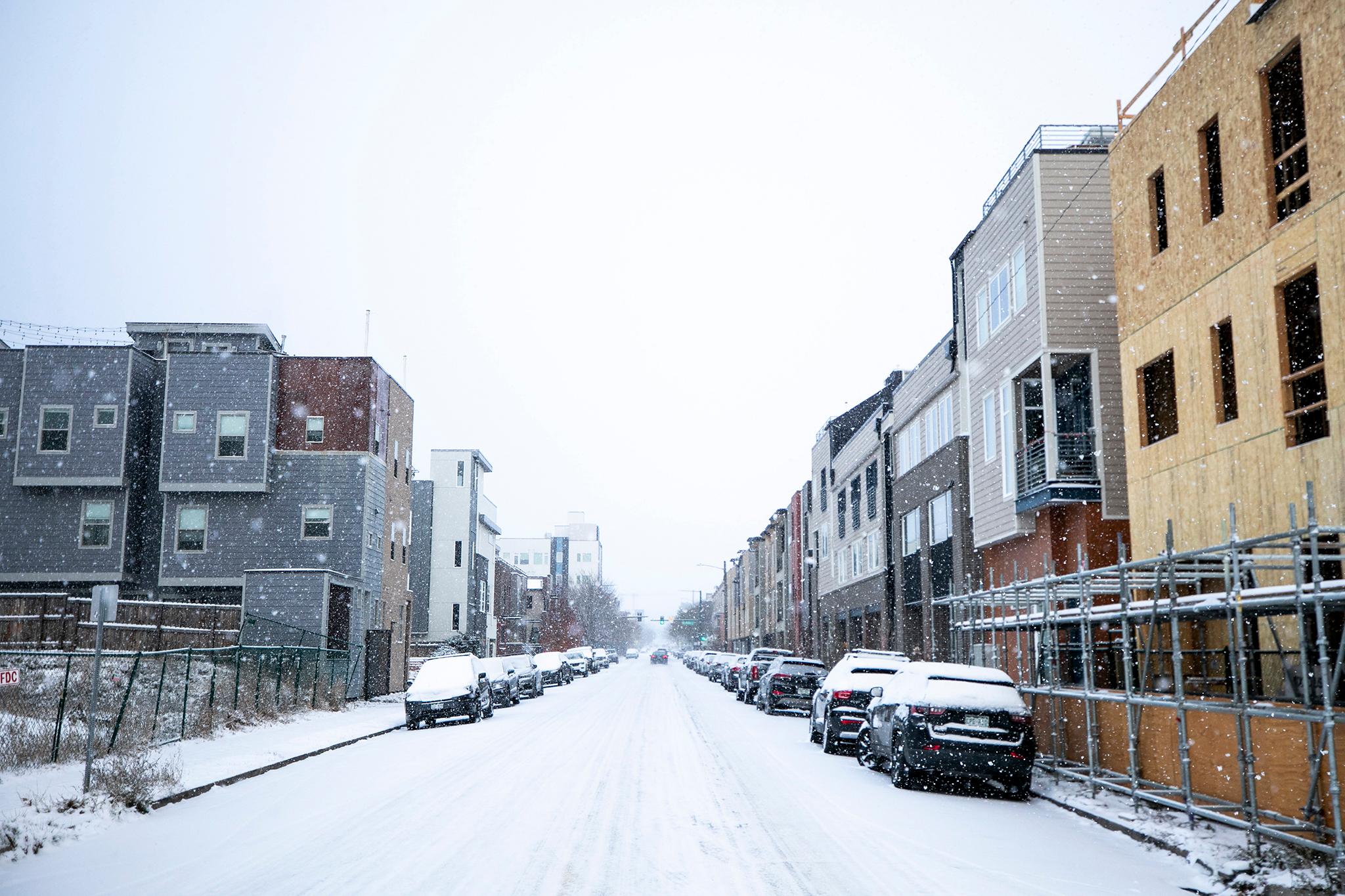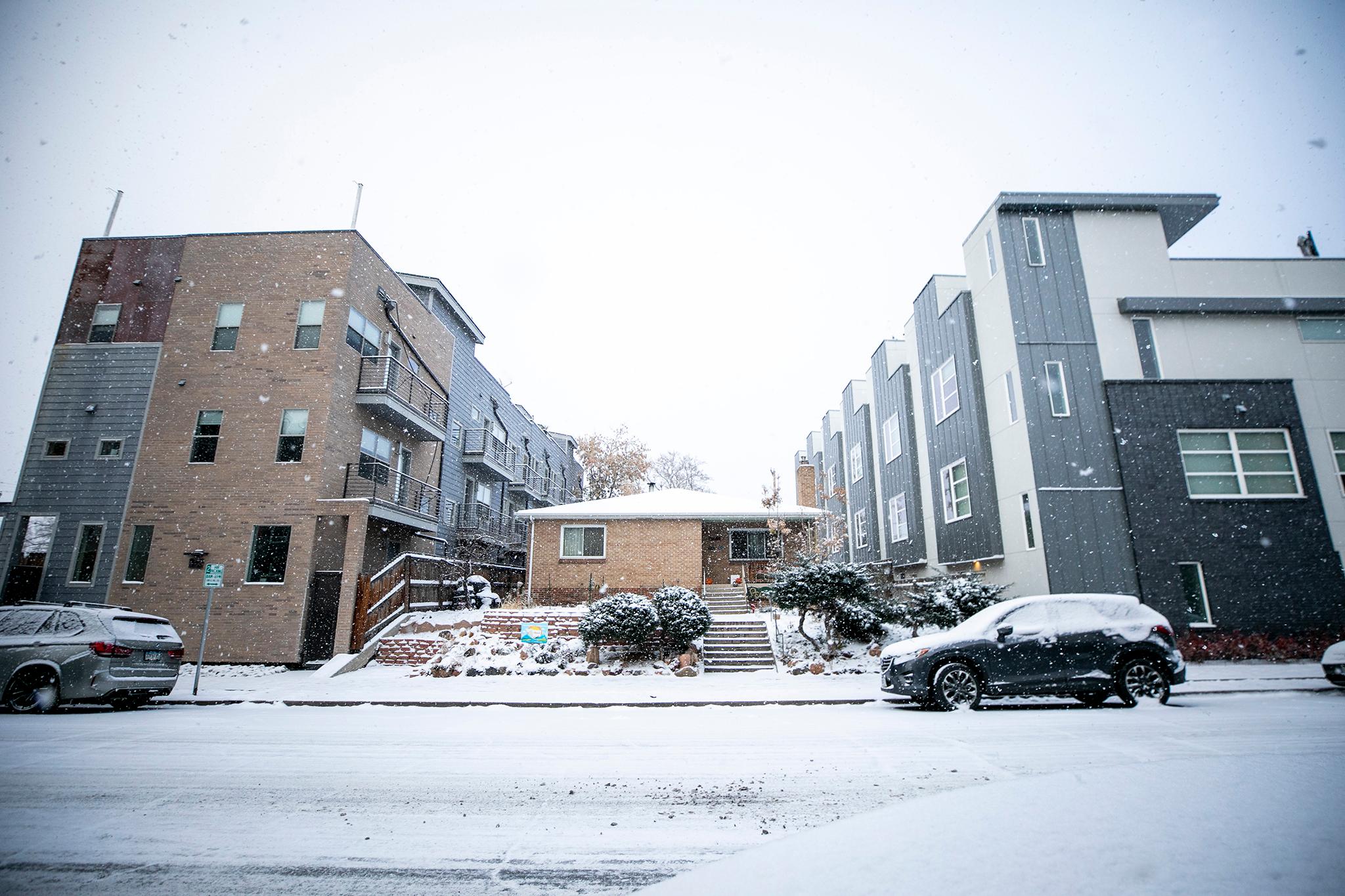This article is a part of Denverite's Street Week: Tennyson series. We're exploring the area by way of the history, people, carp-filled lakes and weird houses that define it. Read more Tennyson stories here.

The first time I walked along Tennyson Street was the summer of 2021. I was writing a story on BookBar, an indie bookstore and wine bar-coffee shop combo that reader Sarah Frazer nominated as a place she was glad made it through the challenges of the pandemic.
Frazer told us that BookBar was one of the main reasons she moved to the Berkeley neighborhood. It was her type of local business on a "Main Street" type strip of other local businesses.
That commercial but quaint feeling is what you get walking along the business corridor. Starting at West 38th Avenue where Javier's Diner serves up a breakfast enthusiast's dream, Mexican-style, and ending at the picturesque Berkeley Lake Park on West 46th Avenue.
But change is heavy in the air, as it has been for most of the street's history. Construction scaffolding lines the street. For-sale signs are plastered across windows of storefronts. You feel the push of development against preservation efforts.
To understand how Tennyson got to this point, let's take a journey through its past.

First things first, Tennyson used to be called West 44th Avenue.
And it existed in the Town of North Denver in the late 1800s. That town was renamed Berkeley in 1898 and was annexed into Denver in 1902-03.
In 1904, Howard C. Maloney began renaming streets, going in Alphabetical order with themes in certain areas. According to historian Phil Goodstein, the theme west of Zuni Street was Great Americans, but Maloney "apparently runs out of energy" toward the bottom half of the alphabet.
Tennyson is named after Alfred Tennyson, an English poet.
"Raleigh is for Walter Raleigh, so he has the British theme," Goodstein said. "I guess he was just looking for a well-known name for the T street out of it and he came up with Tennyson."
Tennyson is more than just the business corridor in Berkeley.
Tennyson is a collector street, moving traffic from business districts or local neighborhood blocks, like Stuart Street, to arterials, such as 38th Avenue.
Tennyson follows the north-south Denver street grid, where parallel streets are either a mile or a half a mile apart from each other. So, Tennyson typically runs about a mile west from Federal Boulevard.
Typically because, as Goodstein puts it, developers in the 19th century were allowed to place streets where they chose as they claimed various portions of the city. That means Tennyson runs a little wild.
Tennyson enters Denver proper in Regis and flows normally through Berkley and West Highland. It's interrupted by Sloan's Lake, starts back up in West Colfax, is cut off again by the Dry Gulch but continues into Villa Park.
Then it disappears, meaning Barnum and half of Westwood don't see Tennyson at all. Goodstein said that's a developer's choice.
This portion is purely residential with the house layouts going east to west between Utica and Stuart. When you hit West Kentucky Avenue, that grid gets split and Tennyson reappears. It curves through Harvey Park Lake and turns into Tennyson Way, which means that the street has become a side road. Ultimately, Tennyson fizzles out in Bow Mar.
The main stretch of Tennyson is the commercial corridor in Berkeley and developed that way intentionally.
When the Alcott Postal Station opened at 41st Avenue and Tennyson, businesses flocked to the corridor, seeing an opportunity to create a thriving mixed-use area of small shops and homes.
According to Ruth Eloise Wiberg, author of history book "Rediscovering Northwest Denver: Its History, Its People, Its Landmarks," the "town of Berkeley did not allow industry or large retail establishments." Instead, the town focused on local retailers.
The business corridor was further cemented by the streetcar system. Run, eventually, by the Denver Tramway Company, the route spanned Tennyson from 35th Avenue, where a small shopping plaza still exists, through 46th Avenue.

"Merchants wanted to have their stores close to major street car stops," Goodstein said. "It was basically that element that led to Tennyson Street emerging as a commercial street. It was a prime neighborhood shopping center. There were maybe half a dozen different groceries on the stretch between 38th and 44th Avenue... Numerous drug stores, middle class clothing stores."
The streetcar system allowed Tennyson Street to fully become, what we call today a "transit-oriented development," a walkable neighborhood featuring a functional transportation system, along with residential and commercial spaces.
Hardware stores and pharmacies, entertainment venues such as Elitch Gardens and the Oriental Theater, and many other businesses lined the corridor.

The streetcar system ended in 1950. Automobile ownership grew during that decade, and big box supermarkets and suburban shopping malls, like the Lakeside Shopping Center, sprung up all around.
Goodstein said this combination created a "crisis" for businesses along Tennyson and, in his book "North Side Story: Denver's Most Intriguing Neighborhood," he wrote that the Center "sucked away much of businesses from the old streetcar retail section."
But the business strip survived, anchored by Tennyson Hardware. The shop first opened in 1917 and was renamed by new owner Wayne Kort in 1973.
Kort, according to Goodstein, was instrumental in pushing for business revitalization on the corridor, ultimately helping the street receive $800,000 for a redesign through the Denver Community Development Agency in 1985-86.
"The amazing thing about [Tennyson,] for about 30 years, it didn't have any chain restaurants or businesses there," Goodstein said. "The overwhelming bulk of the establishments were small scale. Usually owners were on the premises conducting the businesses, even on some of the destination shops like Flesher-Hinton Music. The hardware store was a place where you could get almost anything you wanted...and then about 2010, the city decided to improve Tennyson Street and it's all been downhill since then."

Whether it was downhill depends on who you ask, but there's no denying the 2010s were a turning point for the street.
Through a voter-approved bond, Tennyson received about $2.5 million for a streetscape beautification project that sought to widen sidewalks, improve crosswalks, install pedestrian lighting and add trash bins, bike racks and trees to the block. Some money was also used to improve the newly created and named Cesar E. Chavez Park.
Construction started in 2011, shuttering the corridor for about six months. Businesses suffered, including the Kort family-owned hardware store. Then-owner Larry Kort told the Denver Post in 2014 that business decreased heavily while the street was closed and it never really recovered. Other factors contributed to the end of the business but the street closure was notable.
The beautification also brought development and redevelopment.
"We knew that once those streetscape improvements were in, that the redevelopment was going to explode...Lo and behold, what happens? The streetscape gets constructed and this corridor goes crazy. Everything sells, everything gets scrapped, things get redeveloped," said Heather Noyes, a 30-year Berkeley resident and business owner.
Noyes said residents knew that the streetscape plan coupled with the newly adapted zoning code update in 2010 would lead to an increase in residential density. Keeping the business district in mind was supposed to be part of the city's vision, but the businesses were thrown by the wayside, Noyes said

Bungalows and store fronts were replaced with the deceptive front doors of slot homes. The structures increased residential density, but locals argued that they led to loss of both neighborhood character and commercial opportunities for the corridor.
"Commercial districts were losing commercial square footage, one scrape after another after another," Noyes said. "Imagine if at the first floor of every building between 44th and 46th you had small retail space. Imagine what it would be like to walk from the heart of Tennyson to Berkeley Park and how different that would be and how much more money would be generated by these small businesses along those two blocks. But we just didn't have the vision and we didn't have the political will to stop what was happening."
Slot homes were banned in 2018, but the fight to regain control over the neighborhood feel of Tennyson coincided with increased interest in the area, leading to higher home and rent prices -- and more development.
Interest in the neighborhood grew, leading to higher home and rent prices. Tennyson was gentrifying and small business owners were being pushed out.
To help quell business displacement, Councilmember Amanda Sandoval proposed the creation of the "Active Centers and Corridors Design Overlay." The overlay works with existing zoning laws but requires new developments to include commercial space on the first floor. The overlay would save room for businesses as residential development increased.
In the case of Tennyson, it would also preserve the corridor's Main Street character.
City Council approved the overlay in 2021 and Noyes said the change was a step in the right direction, pointing to a new building going up on Tennyson between 45th and 46th Avenues that must allocate space for commercial use.
The overlay maintains Tennyson's neighborhood shopping center identity but doesn't define what type of businesses meet its commercial use requirement.
Tennyson has traditionally been a local, small business corridor. While the 19th century residents of Tennyson wouldn't allow large retail establishments on the corridor, that isn't the case anymore.
There are some Denver-based chains on Tennyson, such as Atomic Pizza and Fat Sully's but bigger chains like the D.C.-based Call Your Mother Deli are starting to fill the overlay requirement.

And national chains like Natural Grocers, which replaced Elitch Lanes bowling alley, have already settled into the area even before the overlay.
The upper hand those chains have is that they can pay higher rents.
"We've lost a lot of businesses in the last couple of years because people just can't afford the increase in rent," Noyes said. "How do we, as a city, develop tools that enable these small businesses to maintain and operate in place? It's going to be a big challenge. I really hope it gets addressed, otherwise, we're just going to turn into seven or eight blocks of nationally owned franchises and we're going to lose the local charm."
So, what's next for the business strip?
Noyes would like to see Berkeley and/or Tennyson Street receive a neighborhood plan that could help maintain the corridor as a local business center.
For now, the strip is bustling. Older businesses such as the Berkeley Inn and Chuck's Barber Shop are still around, having been on Tennyson since the '30s and '60s, respectively.
Parisi pizzeria, trattoria e vino, is celebrating 25 years in operation while businesses like Monkey Fist Tattoo, Hops & Pie and Denver Cat Company have reached their decade-marks on the corridor.
But there have been notable losses in recent years. BookBar closed earlier this year. Local 46 shuttered its doors because of redevelopment.
Tennyson Street is a long road with a long history. Locals hope the business corridor remains the core section of Tennyson, filled with thriving establishments, especially locally owned. Those shops are the soul of Tennyson.
"People can go anywhere to get a Starbucks," Noyes said. "But the locally owned stores are the main attraction over here. It's what creates our kind of unique, charming and, I think, coveted kind of character...What we have is pretty special and I just hope that we, as a city, work together to recognize the role that small local business owners play in kind of that localized neighborhood, commercial, economic growth and vitality."
Read all the stories from Street Week: Tennyson here. (And dip into the Street Week archives with 2021's Morrison Road and 2020's Bruce Randolph.)













